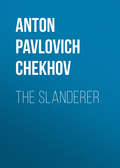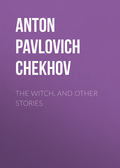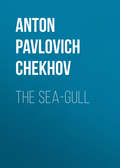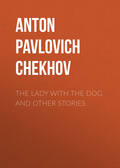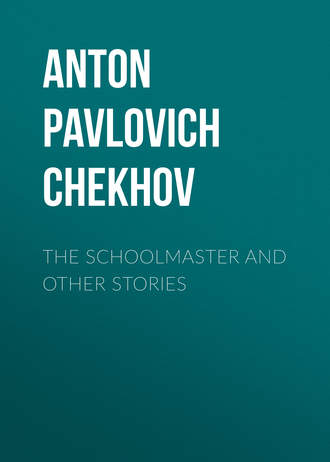
Антон Чехов
The Schoolmaster and Other Stories
AT THE BARBER'S
MORNING. It is not yet seven o'clock, but Makar Kuzmitch Blyostken's shop is already open. The barber himself, an unwashed, greasy, but foppishly dressed youth of three and twenty, is busy clearing up; there is really nothing to be cleared away, but he is perspiring with his exertions. In one place he polishes with a rag, in another he scrapes with his finger or catches a bug and brushes it off the wall.
The barber's shop is small, narrow, and unclean. The log walls are hung with paper suggestive of a cabman's faded shirt. Between the two dingy, perspiring windows there is a thin, creaking, rickety door, above it, green from the damp, a bell which trembles and gives a sickly ring of itself without provocation. Glance into the looking-glass which hangs on one of the walls, and it distorts your countenance in all directions in the most merciless way! The shaving and haircutting is done before this looking-glass. On the little table, as greasy and unwashed as Makar Kuzmitch himself, there is everything: combs, scissors, razors, a ha'porth of wax for the moustache, a ha'porth of powder, a ha'porth of much watered eau de Cologne, and indeed the whole barber's shop is not worth more than fifteen kopecks.
There is a squeaking sound from the invalid bell and an elderly man in a tanned sheepskin and high felt over-boots walks into the shop. His head and neck are wrapped in a woman's shawl.
This is Erast Ivanitch Yagodov, Makar Kuzmitch's godfather. At one time he served as a watchman in the Consistory, now he lives near the Red Pond and works as a locksmith.
"Makarushka, good-day, dear boy!" he says to Makar Kuzmitch, who is absorbed in tidying up.
They kiss each other. Yagodov drags his shawl off his head, crosses himself, and sits down.
"What a long way it is!" he says, sighing and clearing his throat.
"It's no joke! From the Red Pond to the Kaluga gate."
"How are you?"
"In a poor way, my boy. I've had a fever."
"You don't say so! Fever!"
"Yes, I have been in bed a month; I thought I should die. I had extreme unction. Now my hair's coming out. The doctor says I must be shaved. He says the hair will grow again strong. And so, I thought, I'll go to Makar. Better to a relation than to anyone else. He will do it better and he won't take anything for it. It's rather far, that's true, but what of it? It's a walk."
"I'll do it with pleasure. Please sit down."
With a scrape of his foot Makar Kuzmitch indicates a chair. Yagodov sits down and looks at himself in the glass and is apparently pleased with his reflection: the looking-glass displays a face awry, with Kalmuck lips, a broad, blunt nose, and eyes in the forehead. Makar Kuzmitch puts round his client's shoulders a white sheet with yellow spots on it, and begins snipping with the scissors.
"I'll shave you clean to the skin!" he says.
"To be sure. So that I may look like a Tartar, like a bomb. The hair will grow all the thicker."
"How's auntie?"
"Pretty middling. The other day she went as midwife to the major's lady. They gave her a rouble."
"Oh, indeed, a rouble. Hold your ear."
"I am holding it… Mind you don't cut me. Oy, you hurt! You are pulling my hair."
"That doesn't matter. We can't help that in our work. And how is
Anna Erastovna?"
"My daughter? She is all right, she's skipping about. Last week on the Wednesday we betrothed her to Sheikin. Why didn't you come?"
The scissors cease snipping. Makar Kuzmitch drops his hands and asks in a fright:
"Who is betrothed?"
"Anna."
"How's that? To whom?"
"To Sheikin. Prokofy Petrovitch. His aunt's a housekeeper in Zlatoustensky Lane. She is a nice woman. Naturally we are all delighted, thank God. The wedding will be in a week. Mind you come; we will have a good time."
"But how's this, Erast Ivanitch?" says Makar Kuzmitch, pale, astonished, and shrugging his shoulders. "It's.. it's utterly impossible. Why, Anna Erastovna.. why I.. why, I cherished sentiments for her, I had intentions. How could it happen?"
"Why, we just went and betrothed her. He's a good fellow."
Cold drops of perspiration come on the face of Makar Kuzmitch. He puts the scissors down on the table and begins rubbing his nose with his fist.
"I had intentions," he says. "It's impossible, Erast Ivanitch. I.. I am in love with her and have made her the offer of my heart.. And auntie promised. I have always respected you as though you were my father… I always cut your hair for nothing… I have always obliged you, and when my papa died you took the sofa and ten roubles in cash and have never given them back. Do you remember?"
"Remember! of course I do. Only, what sort of a match would you be, Makar? You are nothing of a match. You've neither money nor position, your trade's a paltry one."
"And is Sheikin rich?"
"Sheikin is a member of a union. He has a thousand and a half lent on mortgage. So my boy.. It's no good talking about it, the thing's done. There is no altering it, Makarushka. You must look out for another bride… The world is not so small. Come, cut away. Why are you stopping?"
Makar Kuzmitch is silent and remains motionless, then he takes a handkerchief out of his pocket and begins to cry.
"Come, what is it?" Erast Ivanitch comforts him. "Give over. Fie, he is blubbering like a woman! You finish my head and then cry. Take up the scissors!"
Makar Kuzmitch takes up the scissors, stares vacantly at them for a minute, then drops them again on the table. His hands are shaking.
"I can't," he says. "I can't do it just now. I haven't the strength! I am a miserable man! And she is miserable! We loved each other, we had given each other our promise and we have been separated by unkind people without any pity. Go away, Erast Ivanitch! I can't bear the sight of you."
"So I'll come to-morrow, Makarushka. You will finish me to-morrow."
"Right."
"You calm yourself and I will come to you early in the morning."
Erast Ivanitch has half his head shaven to the skin and looks like a convict. It is awkward to be left with a head like that, but there is no help for it. He wraps his head in the shawl and walks out of the barber's shop. Left alone, Makar Kuzmitch sits down and goes on quietly weeping.
Early next morning Erast Ivanitch comes again.
"What do you want?" Makar Kuzmitch asks him coldly.
"Finish cutting my hair, Makarushka. There is half the head left to do."
"Kindly give me the money in advance. I won't cut it for nothing."
Without saying a word Erast Ivanitch goes out, and to this day his hair is long on one side of the head and short on the other. He regards it as extravagance to pay for having his hair cut and is waiting for the hair to grow of itself on the shaven side.
He danced at the wedding in that condition.
AN INADVERTENCE
PYOTR PETROVITCH STRIZHIN, the nephew of Madame Ivanov, the colonel's widow – the man whose new goloshes were stolen last year, – came home from a christening party at two o'clock in the morning. To avoid waking the household he took off his things in the lobby, made his way on tiptoe to his room, holding his breath, and began getting ready for bed without lighting a candle.
Strizhin leads a sober and regular life. He has a sanctimonious expression of face, he reads nothing but religious and edifying books, but at the christening party, in his delight that Lyubov Spiridonovna had passed through her confinement successfully, he had permitted himself to drink four glasses of vodka and a glass of wine, the taste of which suggested something midway between vinegar and castor oil. Spirituous liquors are like sea-water and glory: the more you imbibe of them the greater your thirst. And now as he undressed, Strizhin was aware of an overwhelming craving for drink.
"I believe Dashenka has some vodka in the cupboard in the right-hand corner," he thought. "If I drink one wine-glassful, she won't notice it."
After some hesitation, overcoming his fears, Strizhin went to the cupboard. Cautiously opening the door he felt in the right-hand corner for a bottle and poured out a wine-glassful, put the bottle back in its place, then, making the sign of the cross, drank it off. And immediately something like a miracle took place. Strizhin was flung back from the cupboard to the chest with fearful force like a bomb. There were flashes before his eyes, he felt as though he could not breathe, and all over his body he had a sensation as though he had fallen into a marsh full of leeches. It seemed to him as though, instead of vodka, he had swallowed dynamite, which blew up his body, the house, and the whole street… His head, his arms, his legs – all seemed to be torn off and to be flying away somewhere to the devil, into space.
For some three minutes he lay on the chest, not moving and scarcely breathing, then he got up and asked himself:
"Where am I?"
The first thing of which he was clearly conscious on coming to himself was the pronounced smell of paraffin.
"Holy saints," he thought in horror, "it's paraffin I have drunk instead of vodka."
The thought that he had poisoned himself threw him into a cold shiver, then into a fever. That it was really poison that he had taken was proved not only by the smell in the room but also by the burning taste in his mouth, the flashes before his eyes, the ringing in his head, and the colicky pain in his stomach. Feeling the approach of death and not buoying himself up with false hopes, he wanted to say good-bye to those nearest to him, and made his way to Dashenka's bedroom (being a widower he had his sister-in-law called Dashenka, an old maid, living in the flat to keep house for him).
"Dashenka," he said in a tearful voice as he went into the bedroom, "dear Dashenka!"
Something grumbled in the darkness and uttered a deep sigh.
"Dashenka."
"Eh? What?" A woman's voice articulated rapidly. "Is that you, Pyotr Petrovitch? Are you back already? Well, what is it? What has the baby been christened? Who was godmother?"
"The godmother was Natalya Andreyevna Velikosvyetsky, and the godfather Pavel Ivanitch Bezsonnitsin… I.. I believe, Dashenka, I am dying. And the baby has been christened Olimpiada, in honour of their kind patroness… I.. I have just drunk paraffin, Dashenka!"
"What next! You don't say they gave you paraffin there?"
"I must own I wanted to get a drink of vodka without asking you, and.. and the Lord chastised me: by accident in the dark I took paraffin… What am I to do?"
Dashenka, hearing that the cupboard had been opened without her permission, grew more wide-awake… She quickly lighted a candle, jumped out of bed, and in her nightgown, a freckled, bony figure in curl-papers, padded with bare feet to the cupboard.
"Who told you you might?" she asked sternly, as she scrutinized the inside of the cupboard. "Was the vodka put there for you?"
"I.. I haven't drunk vodka but paraffin, Dashenka." muttered
Strizhin, mopping the cold sweat on his brow.
"And what did you want to touch the paraffin for? That's nothing to do with you, is it? Is it put there for you? Or do you suppose paraffin costs nothing? Eh? Do you know what paraffin is now? Do you know?"
"Dear Dashenka," moaned Strizhin, "it's a question of life and death, and you talk about money!"
"He's drunk himself tipsy and now he pokes his nose into the cupboard!" cried Dashenka, angrily slamming the cupboard door. "Oh, the monsters, the tormentors! I'm a martyr, a miserable woman, no peace day or night! Vipers, basilisks, accursed Herods, may you suffer the same in the world to come! I am going to-morrow! I am a maiden lady and I won't allow you to stand before me in your underclothes! How dare you look at me when I am not dressed!"
And she went on and on… Knowing that when Dashenka was enraged there was no moving her with prayers or vows or even by firing a cannon, Strizhin waved his hand in despair, dressed, and made up his mind to go to the doctor. But a doctor is only readily found when he is not wanted. After running through three streets and ringing five times at Dr. Tchepharyants's, and seven times at Dr. Bultyhin's, Strizhin raced off to a chemist's shop, thinking possibly the chemist could help him. There, after a long interval, a little dark and curly-headed chemist came out to him in his dressing gown, with drowsy eyes, and such a wise and serious face that it was positively terrifying.
"What do you want?" he asked in a tone in which only very wise and dignified chemists of Jewish persuasion can speak.
"For God's sake.. I entreat you." said Strizhin breathlessly, "give me something. I have just accidentally drunk paraffin, I am dying!"
"I beg you not to excite yourself and to answer the questions I am about to put to you. The very fact that you are excited prevents me from understanding you. You have drunk paraffin. Yes?"
"Yes, paraffin! Please save me!"
The chemist went coolly and gravely to the desk, opened a book, became absorbed in reading it. After reading a couple of pages he shrugged one shoulder and then the other, made a contemptuous grimace and, after thinking for a minute, went into the adjoining room. The clock struck four, and when it pointed to ten minutes past the chemist came back with another book and again plunged into reading.
"H'm," he said as though puzzled, "the very fact that you feel unwell shows you ought to apply to a doctor, not a chemist."
"But I have been to the doctors already. I could not ring them up."
"H'm.. you don't regard us chemists as human beings, and disturb our rest even at four o'clock at night, though every dog, every cat, can rest in peace… You don't try to understand anything, and to your thinking we are not people and our nerves are like cords."
Strizhin listened to the chemist, heaved a sigh, and went home.
"So I am fated to die," he thought.
And in his mouth was a burning and a taste of paraffin, there were twinges in his stomach, and a sound of boom, boom, boom in his ears. Every moment it seemed to him that his end was near, that his heart was no longer beating.
Returning home he made haste to write: "Let no one be blamed for my death," then he said his prayers, lay down and pulled the bedclothes over his head. He lay awake till morning expecting death, and all the time he kept fancying how his grave would be covered with fresh green grass and how the birds would twitter over it..
And in the morning he was sitting on his bed, saying with a smile to Dashenka:
"One who leads a steady and regular life, dear sister, is unaffected by any poison. Take me, for example. I have been on the verge of death. I was dying and in agony, yet now I am all right. There is only a burning in my mouth and a soreness in my throat, but I am all right all over, thank God… And why? It's because of my regular life."
"No, it's because it's inferior paraffin!" sighed Dashenka, thinking of the household expenses and gazing into space. "The man at the shop could not have given me the best quality, but that at three farthings. I am a martyr, I am a miserable woman. You monsters! May you suffer the same, in the world to come, accursed Herods.."
And she went on and on..
THE ALBUM
KRATEROV, the titular councillor, as thin and slender as the Admiralty spire, stepped forward and, addressing Zhmyhov, said:
"Your Excellency! Moved and touched to the bottom of our hearts by the way you have ruled us during long years, and by your fatherly care.."
"During the course of more than ten years.." Zakusin prompted.
"During the course of more than ten years, we, your subordinates, on this so memorable for us.. er.. day, beg your Excellency to accept in token of our respect and profound gratitude this album with our portraits in it, and express our hope that for the duration of your distinguished life, that for long, long years to come, to your dying day you may not abandon us.."
"With your fatherly guidance in the path of justice and progress.." added Zakusin, wiping from his brow the perspiration that had suddenly appeared on it; he was evidently longing to speak, and in all probability had a speech ready. "And," he wound up, "may your standard fly for long, long years in the career of genius, industry, and social self-consciousness."
A tear trickled down the wrinkled left cheek of Zhmyhov.
"Gentlemen!" he said in a shaking voice, "I did not expect, I had no idea that you were going to celebrate my modest jubilee… I am touched indeed.. very much so… I shall not forget this moment to my dying day, and believe me.. believe me, friends, that no one is so desirous of your welfare as I am.. and if there has been anything.. it was for your benefit."
Zhmyhov, the actual civil councillor, kissed the titular councillor Kraterov, who had not expected such an honour, and turned pale with delight. Then the chief made a gesture that signified that he could not speak for emotion, and shed tears as though an expensive album had not been presented to him, but on the contrary, taken from him.. Then when he had a little recovered and said a few more words full of feeling and given everyone his hand to shake, he went downstairs amid loud and joyful cheers, got into his carriage and drove off, followed by their blessings. As he sat in his carriage he was aware of a flood of joyous feelings such as he had never known before, and once more he shed tears.
At home new delights awaited him. There his family, his friends, and acquaintances had prepared him such an ovation that it seemed to him that he really had been of very great service to his country, and that if he had never existed his country would perhaps have been in a very bad way. The jubilee dinner was made up of toasts, speeches, and tears. In short, Zhmyhov had never expected that his merits would be so warmly appreciated.
"Gentlemen!" he said before the dessert, "two hours ago I was recompensed for all the sufferings a man has to undergo who is the servant, so to say, not of routine, not of the letter, but of duty! Through the whole duration of my service I have constantly adhered to the principle; – the public does not exist for us, but we for the public, and to-day I received the highest reward! My subordinates presented me with an album.. see! I was touched."
Festive faces bent over the album and began examining it.
"It's a pretty album," said Zhmyhov's daughter Olya, "it must have cost fifty roubles, I do believe. Oh, it's charming! You must give me the album, papa, do you hear? I'll take care of it, it's so pretty."
After dinner Olya carried off the album to her room and shut it up in her table drawer. Next day she took the clerks out of it, flung them on the floor, and put her school friends in their place. The government uniforms made way for white pelerines. Kolya, his Excellency's little son, picked up the clerks and painted their clothes red. Those who had no moustaches he presented with green moustaches and added brown beards to the beardless. When there was nothing left to paint he cut the little men out of the card-board, pricked their eyes with a pin, and began playing soldiers with them. After cutting out the titular councillor Kraterov, he fixed him on a match-box and carried him in that state to his father's study.
"Papa, a monument, look!"
Zhmyhov burst out laughing, lurched forward, and, looking tenderly at the child, gave him a warm kiss on the cheek.
"There, you rogue, go and show mamma; let mamma look too."
OH! THE PUBLIC
"HERE goes, I've done with drinking! Nothing.. n-o-thing shall tempt me to it. It's time to take myself in hand; I must buck up and work.. You're glad to get your salary, so you must do your work honestly, heartily, conscientiously, regardless of sleep and comfort. Chuck taking it easy. You've got into the way of taking a salary for nothing, my boy – that's not the right thing.. not the right thing at all.."
After administering to himself several such lectures Podtyagin, the head ticket collector, begins to feel an irresistible impulse to get to work. It is past one o'clock at night, but in spite of that he wakes the ticket collectors and with them goes up and down the railway carriages, inspecting the tickets.
"T-t-t-ickets.. P-p-p-please!" he keeps shouting, briskly snapping the clippers.
Sleepy figures, shrouded in the twilight of the railway carriages, start, shake their heads, and produce their tickets.
"T-t-t-tickets, please!" Podtyagin addresses a second-class passenger, a lean, scraggy-looking man, wrapped up in a fur coat and a rug and surrounded with pillows. "Tickets, please!"
The scraggy-looking man makes no reply. He is buried in sleep. The head ticket-collector touches him on the shoulder and repeats impatiently: "T-t-tickets, p-p-please!"
The passenger starts, opens his eyes, and gazes in alarm at Podtyagin.
"What?.. Who?.. Eh?"
"You're asked in plain language: t-t-tickets, p-p-please! If you please!"
"My God!" moans the scraggy-looking man, pulling a woebegone face. "Good Heavens! I'm suffering from rheumatism… I haven't slept for three nights! I've just taken morphia on purpose to get to sleep, and you.. with your tickets! It's merciless, it's inhuman! If you knew how hard it is for me to sleep you wouldn't disturb me for such nonsense… It's cruel, it's absurd! And what do you want with my ticket! It's positively stupid!"
Podtyagin considers whether to take offence or not – and decides to take offence.
"Don't shout here! This is not a tavern!"
"No, in a tavern people are more humane.." coughs the passenger. "Perhaps you'll let me go to sleep another time! It's extraordinary: I've travelled abroad, all over the place, and no one asked for my ticket there, but here you're at it again and again, as though the devil were after you.."
"Well, you'd better go abroad again since you like it so much."
"It's stupid, sir! Yes! As though it's not enough killing the passengers with fumes and stuffiness and draughts, they want to strangle us with red tape, too, damn it all! He must have the ticket! My goodness, what zeal! If it were of any use to the company – but half the passengers are travelling without a ticket!"
"Listen, sir!" cries Podtyagin, flaring up. "If you don't leave off shouting and disturbing the public, I shall be obliged to put you out at the next station and to draw up a report on the incident!"
"This is revolting!" exclaims "the public," growing indignant.
"Persecuting an invalid! Listen, and have some consideration!"
"But the gentleman himself was abusive!" says Podtyagin, a little scared. "Very well… I won't take the ticket.. as you like.. Only, of course, as you know very well, it's my duty to do so… If it were not my duty, then, of course.. You can ask the station-master.. ask anyone you like.."
Podtyagin shrugs his shoulders and walks away from the invalid. At first he feels aggrieved and somewhat injured, then, after passing through two or three carriages, he begins to feel a certain uneasiness not unlike the pricking of conscience in his ticket-collector's bosom.
"There certainly was no need to wake the invalid," he thinks, "though it was not my fault..They imagine I did it wantonly, idly. They don't know that I'm bound in duty.. if they don't believe it, I can bring the station-master to them." A station. The train stops five minutes. Before the third bell, Podtyagin enters the same second-class carriage. Behind him stalks the station-master in a red cap.
"This gentleman here," Podtyagin begins, "declares that I have no right to ask for his ticket and.. and is offended at it. I ask you, Mr. Station-master, to explain to him… Do I ask for tickets according to regulation or to please myself? Sir," Podtyagin addresses the scraggy-looking man, "sir! you can ask the station-master here if you don't believe me."
The invalid starts as though he had been stung, opens his eyes, and with a woebegone face sinks back in his seat.
"My God! I have taken another powder and only just dozed off when here he is again.. again! I beseech you have some pity on me!"
"You can ask the station-master.. whether I have the right to demand your ticket or not."
"This is insufferable! Take your ticket.. take it! I'll pay for five extra if you'll only let me die in peace! Have you never been ill yourself? Heartless people!"
"This is simply persecution!" A gentleman in military uniform grows indignant. "I can see no other explanation of this persistence."
"Drop it." says the station-master, frowning and pulling
Podtyagin by the sleeve.
Podtyagin shrugs his shoulders and slowly walks after the station-master.
"There's no pleasing them!" he thinks, bewildered. "It was for his sake I brought the station-master, that he might understand and be pacified, and he.. swears!"
Another station. The train stops ten minutes. Before the second bell, while Podtyagin is standing at the refreshment bar, drinking seltzer water, two gentlemen go up to him, one in the uniform of an engineer, and the other in a military overcoat.
"Look here, ticket-collector!" the engineer begins, addressing Podtyagin. "Your behaviour to that invalid passenger has revolted all who witnessed it. My name is Puzitsky; I am an engineer, and this gentleman is a colonel. If you do not apologize to the passenger, we shall make a complaint to the traffic manager, who is a friend of ours."
"Gentlemen! Why of course I.. why of course you." Podtyagin is panic-stricken.
"We don't want explanations. But we warn you, if you don't apologize, we shall see justice done to him."
"Certainly I.. I'll apologize, of course.. To be sure.."
Half an hour later, Podtyagin having thought of an apologetic phrase which would satisfy the passenger without lowering his own dignity, walks into the carriage. "Sir," he addresses the invalid. "Listen, sir.."
The invalid starts and leaps up: "What?"
"I.. what was it?.. You mustn't be offended.."
"Och! Water." gasps the invalid, clutching at his heart. "I'd just taken a third dose of morphia, dropped asleep, and.. again! Good God! when will this torture cease!"
"I only.. you must excuse."
"Oh!.. Put me out at the next station! I can't stand any more
… I.. I am dying.."
"This is mean, disgusting!" cry the "public," revolted. "Go away!
You shall pay for such persecution. Get away!"
Podtyagin waves his hand in despair, sighs, and walks out of the carriage. He goes to the attendants' compartment, sits down at the table, exhausted, and complains:
"Oh, the public! There's no satisfying them! It's no use working and doing one's best! One's driven to drinking and cursing it all.. If you do nothing – they're angry; if you begin doing your duty, they're angry too. There's nothing for it but drink!"
Podtyagin empties a bottle straight off and thinks no more of work, duty, and honesty!



